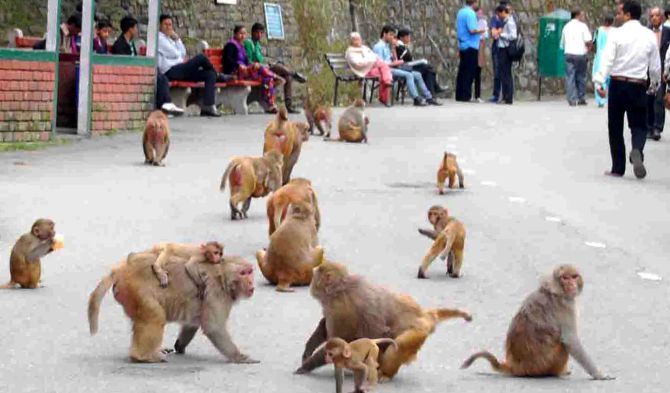Having developed a taste for what humans eat, monkeys are wreaking havoc in Shimla, reports Ashwani Sharma.

Shimla is witnessing an interesting story about animal behaviour, and their dependence on human beings.
Once the coronavirus inspired lockdown kicked off in March, as people stayed indoors and the markets were shut, monkeys quietly disappeared from Shimla’s landscape. Since there was no food available to forage in the streets or their feeding places in residential colonies, they simply upped and left town.
With the state government announcing some relaxations in the lockdown, after nearly 40 days the simians are back in herds, and can be seen jumping over roofs, trees, invading streets, houses and attacking locals, especially women, to snatch away fruits and other eatables. Morning walkers are particularly easy prey, as are children and youth out on cycling trips.
With the opening of markets, business establishments and increased mobility of people, the monkeys have come back more aggressive as they have been starving these last few weeks.
Kalpana Sanghiak, a social activist and yoga trainer, faced a herd of monkeys on the Mall during an early morning walk. She escaped being bitten but sustained injuries and hurt her arms when she fell down in her rush to flee.
“I shouted out loud in panic. My two friends also ran towards me to save me. In this commotion a gentleman walking ahead of us turned back and chased away those monkeys,” she narrates what happened on Sunday.
Wildlife experts who have been studying monkey behaviour in Shimla, says these creatures have become used to eating cooked food. They have now developed a taste for rotis, pizzas, burgers, pastries and spicy meals, so what nature offers them is not so attractive. Plus, it’s easier to grab food items and fruits from passers-by than foraging in the forests.
Says V P Mohan, a retired principal chief conservator of forests, “I can tell you a very basic thing about monkeys. They are highly intelligent and adapt to any situation. Over the years they have become dependent on human beings. They migrated to the forests during the days as they were starving. The moment public activity resumed, monkey herds are back.
“For the past one week or 10 days they have created havoc in my lawn, destroying all ornamental flowers which had grown so beautifully. What can you do, they have developed a taste for ice-creams and pizzas, and have returned quickly once the people stepped,” he explains.
During all of April, when most streets, bazaars, markets, and open spaces like the town’s historic Ridge and Mall road were completely deserted, the monkeys were conspicuous by their absence.
Shimla’s famous Jakhu temple -- where a 108-feet tall statue of Lord Hanuman stands -- did not see the usual monkey activity despite it being their hotspot, as there were no tourists or devotees coming to the temple.
“But now the scene is different. Monkeys have returned,” confirms Kuldeep Sharma, a regular devotee at the temple.
Former Indian Forest Services officer and farmers’ rights activist Dr Kuldeep Tanwar recalls having predicted that the monkeys deserting Shimla during the lockdown was just a temporary phase. “They were not getting any food so after waiting for some days they moved out to villages in the vicinity of Shimla and fed themselves.”
Dr Omesh Bharati, a noted field epidemiologist whose pioneering work on rabid dog bites has earned him the Padma Shri, says, “For the past nearly two months there was a drop in cases of monkey bites in Shimla. It’s because they had migrated during the lockdown. But, I observed only a day back, they are back and knocking at our windows for food. Fortunately, the people are still indoors largely so monkey bite cases are minimal, only two or three a day.”
Monkey were declared vermin in Shimla municipal corporation areas and several other high concentration areas of the state where monkeys were causing huge damage to crops and vegetables.
As per the notification of the ministry of environment and forests issued under section 63 of the WildlIfe (Protection ) Act 1962, any citizen can kill monkeys. The Himachal Pradesh government, in order to check the monkey population, has also sterilised 1.60 lakh monkeys spending over Rs 50 crores.
Some animal rights bodies are opposed to the MoEF notification allowing the killing of monkeys. But Dr Kuldeep Tanwar firmly believes that sterilisation is also no solution. Either monkeys should be displaced, or scientifically culled, he says.










